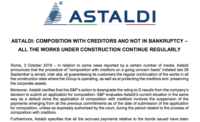Salini Impregilo’s plan to lead an Italian construction conglomerate could become reality by early August, as the Milan-based infrastructure giant finalizes financing to acquire several other domestic builders, including its bankrupt leading competitor, Astaldi.
Backed by more than $1 billion in promised credit from several Italian financial institutions, plus a commitment to raise about $670 million in new capital on its own, Salini Impreglio announced it had revised an earlier offer to purchase a 65% stake in Astaldi, which entered bankruptcy proceedings in September 2018.
Information provided by Salini Impreglio characterized the updated plan as “an acquisition of the best parts of Astaldi, especially the choice projects in its portfolio.”
Both firms are partners in several major projects, including a recently announced 18.7-km high-capacity rail line between Naples and Bari in the Apennine Mountains. Salini Impreglio general manager Massimo Ferrari told Italian media that preserving those projects is essential, “both in the country’s interest and our own.”
Keeping Astaldi afloat is the key to Salini Impreglio’s “Project Italy,” under which the company would create a group “with the scale and resources” to address Italy’s current and future infrastructure needs.
Salini Impreglio also considers “Project Italy” to be in the nation’s economic interest, citing “a systemic risk” posed by financial difficulties plaguing Italy’s other major infrastructure firms. Consolidation under Project Italy, the company adds, would save as 400,000 jobs among small- and mid-sized businesses in the country’s construction supply chain.
In addition to courting Astaldi, Salini Impreglio has already purchased a majority stake tunnelling specialist Cossi Costruzioni SpA. The 170-employee contractor performs most of its work in northern Italy and Switzerland.
A more viable domestic construction market would also boost the Salini Impreglio-led organization’s competitiveness overseas. Addressing a conference hosted by the Italian Institute for International Political Studies in April, Salini Impregilo CEO Pietro Salini said that unlike peer contractors in other countries, “Italian companies are forced to look at global markets because, on the one hand, the domestic market is too small to support their growth and, on the other, they are not at an adequate level to compete in international markets with companies from other countries that are on average five times bigger.”
Salini Impreglio claims that less than 10% of its revenue comes from projects in Italy, while nearly two-thirds of the world’s top 250 builders generate as much as 75% of their revenue domestically.
And with $79 trillion worth of worldwide infrastructure investments expected over the next 20 years, Salini added, “we have to enter into this positive trend as a country system and we can do it only by creating a big national player that can compete on global markets while at the same time count on a robust domestic market.”
Astaldi’s shareholders must still accept the takeover offer, while a restructuring of the firm’s obligations to creditors requires approval by Italian bankruptcy courts.



Post a comment to this article
Report Abusive Comment